






Our program is: Increasing resident stays 8 months longer than the national average1

Reducing hospital readmissions by 38% 2





Gail
Matillo, MPA President & CEOJason Hand, Esq.
VP
PublicPolicy and Legal Affairs
Sheri LeaJean Director of Education
Meredith Van Valkenburgh
Project Director
Heather Conley, MBA Director of Marketing and Membership
Jimmie Fay Griffin, LPN Accounting & Membership ManagerStephanie
Gurley Database ManagerVance Garven Research
CoordinatorSierra Scott FSLA Intern

Chair: Shelley Esden
President and CEO
Sonata Senior Living
Past Chair: Melinda Skirvin
Vice President
Five Star Senior Living
Past Chair Emeritus:
Mary Sue Patchett
Vice Chair: Jay Thomas
Asst. General Counsel – Ops
Atria Senior Living
Secretary: Joe Jedlowski
President
Distinctive Senior Living
Treasurer: Chris Callahan
Sr. Vice President
Lifespace Communities
Parliamentarian: Marian Nease
Berger Singerman
Industry Partner Committee Chair: Matt Depenbrock
Dir of Business Development Guardian Pharmacy
Education Committee Chair: Marisa Strain
Director of Quality Assurance
SRI Management
Hospitality Committee Chair: Gilbert Bolivar
Vice President of Culinary Experience
Retirement Unlimited Inc.
Membership Committee Chair: Krone Weidler
Principal
Cadre Healthcare Realty Advisors
PC Chair: David Nussbaum
Senior Vice President Belmont Village
Editorial and Business Offices
2292 Wednesday St. Suite 1, Tallahassee, FL 32308 850-496-2562 | floridaseniorliving.org
Publisher: Gail Matillo gmatillo@floridaseniorliving.org
Executive Editor: Sheri LeaJean sleajean@floridaseniorliving.org
Creative Director: Katie Reeves ktcreative@me.com
Advertising & Editorial Submissions engage@floridaseniorliving.org
ENGAGE, Volume 1, Issue 1 is published quarterly by Florida Senior Living Association, 2292 Wednesday Street, Suite 1, Tallahassee, Florida, 32308. Florida Senior Living member companies receive subscriptions for communities as part of their membership. Free controlled subscriptions are also available to qualified individuals in the senior living business.
POSTMASTER, SEND ADDRESS CHANGES TO:
ENGAGE, 2292 Wednesday Street, Suite 1, Tallahassee, Florida, 32308. Printed in USA. Copyright 2022. ENGAGE will not be responsible for the return of any unsolicited manuscripts or photographs.
Copyright © 2022 Florida Senior Living Association. All rights reserved. No part of this publication may be reproduced or transmitted in any form – print, electronic, or otherwise – without written permission from Florida Senior Living Association. For media inquiries and advertising information, contact engage@floridaseniorliving.org.
On the Cover:
(pictured left to right beginning on bottom row)
Shelley Esden, Gwen Thibault, Gail Matillo, Jason Hand, Jamie Merrill, Heather Conley, Jay Thomas, Sheri LeaJean, Bill Sciortino, Gilbert Bolivar, Meredith Van Valkenburgh, Sandi Poreda, Janann Holt, Tina Keating, Krone Weidler, Marisa Strain, Damon Thomas, Heidi Kuchenbacker-Robbins, John Moschner, Matt Depenbrock, Jimmie Fay Griffin, Beth Anacreonte
(not pictured): Mary Sue Patchett, Melinda Skirvin, Joe Jedlowski, Chris Callahan, Marian Nease, Lindsey Hacker, Kim Hays, Justin Hutchens, David Nussbaum, Michelle Pierce, Noreen Prescott, Diana Saxton, Michele Thompson

Welcome to the inaugural edition of the Florida Senior Living Association’s magazine, ENGAGE, and our ENGAGE 2022 Senior Living Conference!
As the Chair of this Association and a senior living operator, I want to thank you for being engaged with our industry, especially over the past few years. It’s fair to say we’ve never seen anything like what we’ve just been through, but I also believe we are poised for a future like no other.
As we step boldly into that future, I encourage you to look to this magazine and this membership as not just a resource, but also a source of inspiration and a reserve of experience. We want to help people understand this industry that we have embraced as our passion and often as our life work. We are here to celebrate each other, our team members and above all, our residents.
To that end, please tell us your stories. Ask us questions. Reach out to us for assistance. Let us be your advocates and your greatest champions.
Look for important information on regulatory updates, tips on how to effectively engage public officials, resources for building a strong and connected team, and much, much more. We truly are here to serve you.
I hope you are reading this at The Ritz-Carlton Orlando, getting ready for an exciting and engaging week among your colleagues and peers. But if not, let us know how we can help you access the education and inspiration we’re getting ready to experience.
Above all, let’s boldly seize that future. Together.
For the first edition, we wanted to share a brief history of FSLA, including our many accomplishments to date. We have accomplished much in our short nine years, and we still have a lot to do.
In 2011 and 2012, the Miami Herald released a 6-part investigative series, “Neglected to Death” focusing on the state’s oversight of assisted living and the mentally ill that resulted in closures, punishment of violators and the beginning of tougher laws and regulations. In the wake of this, several community executives recognized the need for a state association to focus on senior assisted living, memory care and independent communities.
At the same time, another issue facing senior providers was that Florida needed an organization to focus on passing legislation, improving and updating burdensome regulations, and creating an attractive state for seniors to live and retire.
Argentum — a national senior living association — and its board of directors graciously agreed to help Florida providers begin a new chapter organization, and FL ALFA was established with approximately 180 communities and founding board members. James McFaddin from Southern Group was hired as the outside lobbyist, and Gail Matillo was hired in January 2013 as the Executive Director.
In 2014, Argentum selected six states to serve as “power” states, which meant Florida increased its dues and hired two new staff. Additionally, the association was gifted with another organization, the Retirement Housing Council, which is now the Florida Senior Living Institute, a 501(c)3 organization.
So, the association got busy and got things done.
In 2015, ALF legislation passed that had been presented to the legislature since 2011, and one success in the bill was allowing nurses to practice within the scope of their licensure. The rule also allowed standard assisted living facilities to admit residents that needed oxygen, colostomy care, or anti-embolism stockings.
In January 2016, the association changed its name to Florida Argentum; in 2018 another name change to Florida Senior Living Association brought the organization to its current level of recognition with communities, legislators, and industry professionals.
In 2016, the association passed a fire and life safety bill which updated design concepts including wider hallways, hallway benches, memory care updates, fire resident doorways, and longer corridors. The next year, the association secured an additional $5 million in state funding for Medicaid Assistive Care Services to provide extra money to low-income residents.
In 2018, FSLA worked with the Agency for Health Care Administration to pass a bill that would prevent unlicensed ALFs from operating in the state; this also helped reduce much of the negative press about ALFs. In 2019, we assisted with passage of a continuing care retirement community (CCRC) bill which improved early signs of CCRC solvency; gave the Office of Insurance Regulation authority to remove management; and revised minimum liquid reserves and withdrawals from reserve account. And, we were successful in negotiating additional provisions for ALFs in the generator statutes and rules.
In 2020, FSLA passed legislation that allowed assistive devices to be used in ALFs. Until this time, ALFs could not take advantage of new medical technologies that they could use in their homes. Now, ALF residents can use the latest technologies to help them remain independent. The following year in the midst of the pandemic, FSLA worked to pass limitations of COVID-19 liability to prevent meritless claims and ensured ALFs were excluded from the ban on COVID-19 passports.
FSLA also received two grants -- a grant through the Agency for Health Care Administration to provide both train-the-trainer and staff infection control training to all ALFs; and a second grant in partnership with TruMont and MyCNAJobs, to provide home health aide training to new or existing staff. And the big news of 2021 was the purchase of our headquarters building at 2292 Wednesday Street in Tallahassee.
In 2022, FSLA worked to extend the limitation of COVID-19 liability for health care providers, advocate for relief from the workforce crisis, and the need to reduce increasing insurance premiums. FSLA also received $500,000 from the state budget to train CNAs in all ALFs.
FSLA has been very successful and built a strong reputation as a trusted resource. Membership has grown to more than 460 communities and industry partners and employs six full-time staff, two part-time staff, an intern and four outside consultants.
Though FSLA’s efforts have been very successful, and we have built a strong reputation and presence in Florida as a trusted resource for senior living, there is much more work to be done.
FSLA is passionate about helping its members and we are dedicated to providing you the resources you need to care for the greatest generation and those to come.
Stay connected, follow us, and get more engaged on Florida Senior Living Association’s journey to Boldly Define the Future of Senior Living.
Since 2013, Florida Senior Living Association (FSLA) has been proudly telling your story, advocating for positive changes for Florida’s senior living communities. We are your champion, determined to help you overcome obstacles and succeed.
FSLA passed ALF legislation that had been presented to the legislature since 2011 – one success in the bill was allowing nurses to practice within the scope of their licensure and in rule allowed standard assisted living facilities to admit residents that needed oxygen, colostomy care, or anti-embolism stockings.
FSLA passed a fire & life safety bill which updated design concepts including wider hallways, hallway benches, memory care updates, fire resident doorways, and longer corridors.
FSLA secured an additional $5 million in state funding for Medicaid Assistive Care Services to provide extra money to low-incomed residents.
Worked with AHCA and passed a bill that would prevent unlicensed ALFs from operating in the state and reduced much of the negative press about ALFs.
FSLA assisted with passage of a CCRC bill which improved early signs of CCRC solvency; gave OIR authority to remove management, revised minimum liquid reserves and withdrawals from reserve account.
Negotiated additional provisions for ALFs in the generator statutes and rules.
FSLA passed legislation that allowed assistive devices to be used in ALFs. Up until this time, ALFs could not take advantage of the new medical technologies. Now, ALF residents can use the latest technologies to help them remain independent.
FSLA Purchased headquarters building.
FSLA worked to pass limitations of COVID-19 liability to prevent meritless claims, and ensured ALFs were excluded from the ban on COVID-19 passports.
FSLA worked to extend the limitation of COVID-19 liability for health care providers, advocate for relief from the workforce crisis, and the need to reduce increasing insurance premiums.
FSLA CNA Funding request for $500,000 was included as part of the 2022-2023 state budget and approved by Governor Ron DeSantis.
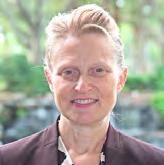
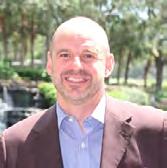
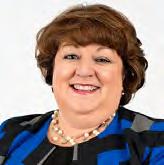
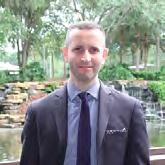
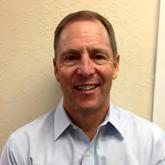
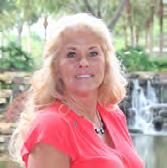
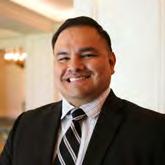


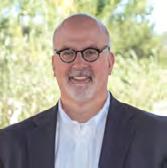
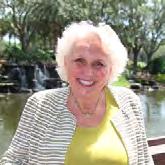
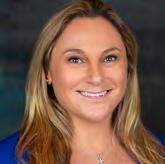



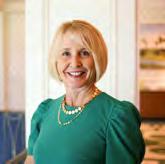




james
mcfaddin Southern Group

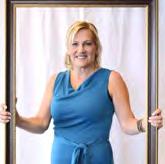

Baker Donelson
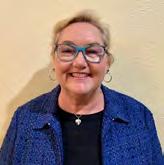
poreda
PAC Management


greg cochran
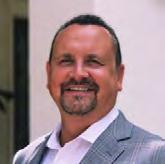


Thomson
Brock Luger & Co.
I recently sat on a panel discussing advice on how to achieve career growth. What steps to take? How to achieve it? What are the secrets to success? Most people at some point have been touched by a great leader, because great leaders bring out the best in others. They are great listeners and focus their time helping people to overcome obstacles, and recognize the value that everyone brings to the table. That said, often times, a leader needs to take the time to look within themselves so they can continue to help others. Therefore, while I could share strategies, leadership tips, books and experiences with you, those things are not going to help you achieve success until you take the time to look within yourself first, as self-awareness is one of the key characteristics to effective leaders. You see, in my opinion, some of the best advice I can give on how to achieve success and growth is to identify what you are fearful of.
At one point in my life, I was very fearful of public speaking. While I would tell myself that I had to get through it, I would also (in the moment) break out into a complete sweat, get the worst dry mouth (where my tongue would stick to the roof of my mouth), and my heart would beat so rapidly that I could hear it inside my head (fun, I know!). After too many of those times, I decided to talk through my feelings and my fear, basically digging deeper into why I felt like this. It was at that time when I realized my TRUE fear was not on the public speaking portion, but more so on not wanting to be embarrassed.
Leaders are typically life-long learners, very curious all the time. This translates into developing themselves and uncovering underlying fears so they can grow, just as I had to. So ask yourself, when is the last time you felt fearful or anxious? Did you get yourself worked up unnecessarily? Did it affect your eating, sleeping and ability to be productive? Did it affect you physically, just as it did me? FEAR is a real thing, and it can at times be debilitating. That said FEAR is also a mindset, and something that can be changed over time. We often ‘over-create’ things in our minds and need to take a step back and look at the situation objectively, sometimes even getting another person to help you see things from a different perspective. When we create these negative scenarios in our minds, it leads us into all the negative effects of fear. So if we can use our minds to create these fearful scenarios, then we can learn how to ‘un-create’ these scenarios also.
It can be hard to overcome fear, because you have to admit fear. This might feel like admitting
defeat, however, it is actually the opposite of defeat. Recognizing fear is one of the truest forms of humility and overcoming it breeds tenacity. It forces you to selfreflect and ‘dig deep’ into where the feeling is coming from. Looking inside ourselves is uncomfortable, but growth only happens when you are uncomfortable. If you fail to seek out fears, your fears end up seeking you, either way you get to choose to adapt to that fear, or overcome it. Had we owned our fears ahead of time, we could have taken control to our thoughts, and grow from that experience over time.
What will you lose if you don’t conquer your fear? Will you gain a new skillset if you do? You see, true leaders have a GROWTH mindset, and that means overcoming our own obstacles, expanding our capabilities and growing ourselves. When you grow, so do those around you, which means you are equipping new leaders, through your actions.
jamie merrill Chief Operating Officer Sonata Senior Living
We often ‘over-create’ things in our minds and need to take a step back and look at the situation objectively, sometimes even getting another person to help you see things from a different perspective. When we create these negative scenarios in our minds, it leads us into all the negative effects of fear.by aaron fish
Senior living operations leaders have to wear many hats. And the question always arises - how do they get everything done that is needed in a given day? And because of this, one area that gets overlooked by many of our executive directors is meal service and the food & beverage operation as a whole.
Meals and the experience around them are critical to the overall success of a community. Bad food can give you a bad reputation, while an amazing and engaging chef will wow prospects and close your back door. But one critical piece of making your senior living food & beverage operation a success is one that many overlook. It’s the role of the Executive Director.

A community Executive Director has a huge role in maintaining and creating a successful F&B operation. But oftentimes EDs do not have a culinary or hospitality background, so they focus their energies elsewhere because “they don’t know anything about the kitchen”. This is both a mistake and easy to fix. To help our operations leaders be successful, here are my five daily tasks that every Executive Director should be doing to ensure the long-term success of the F&B operation.

Seeing the Executive Director at this mission-critical meeting adds increased value to it for all F&B employees. It also allows the ED to share updates and create better relationships with your F&B team. And for the ED, it lets them keep a pulse on how the team is doing and if the leaders of the department have things on task.

Just as important as walking your tour route everyday, a purposeful walkthrough of your kitchen is essential to support your F&B team in maintaining organization and cleanliness standards. If your organization doesn’t have a daily checklist for you to use, create your own or find one online.
Even with the most talented chef, production mistakes can happen. Tasting menu items prior to service helps you as the community leader be proactive in preventing customer complaints around food quality. It also shows the F&B team that you are invested in the quality of their final product and is a great lead by example method of the value of quality assurance.
Your presence as an Executive Director allows for an “outsider’s” perspective on service flow and staff training needs. It gives residents assurance that you have a handle on meal service and helps reduce complaint escalation, and shows that you value the work the F&B team does by being there for support and assistance if needed.
Food is your second largest expense outside of labor. If the F&B team makes daily purchases, your procurement process is broken. This will lead to lost productivity in the kitchen, and usually leads to significant overspend. A daily review of spending allows you to be proactive in managing the food budget and helping your F&B leader develop better strategies and processes for purchasing.
The best part of all of these activities is that not only does it allow the executive director to be more fully engaged in the operation of their F&B operation, over time it will allow them to gain better confidence in their ability to manage this department. And a well-rounded leader is the best kind of leader.
aaron fish Founder & CEO Trestle Hospitality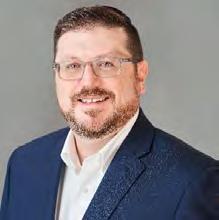
The bill extends the limitation of liability for COVID-19 claims created last year for health care providers. When the COVID liability bill passed last year, it was only effective for health care providers for 1 year –until March 29, 2022. Months ago, FSLA was among the first to sound the alarm that the language was expiring and that an extension was needed in light of the continuing pandemic.
FSLA quickly engaged with the broad-based provider coalition that worked to pass the bill last year and assumed a leadership role in advocating to the Florida Legislature to bring this to their attention and garner their support. The net result

Current law authorizes home health aides and CNAs to perform certain tasks in providing assistance to ALF residents with self-administration of medication that home health aides and CNAs are not currently authorized to provide if they work for a home health agency.
jason hand VP of Public Policy & Legal Affairs Florida Senior Living Association
was to extend these protections until June 1, 2023. The provisions extended include liability protections for COVID-19-related claims against a health care provider mainly related to claims arising from:
• The diagnosis or treatment of a person for COVID-19;
• The provision of a novel or experimental COVID-19 treatment;
• The transmission of COVID-19; and
• The delay or cancellation of a surgery or medical procedure.
The provisions extended also include an affirmative defense for health care providers who can prove substantial compliance with various government issued standards.
This can cause confusion as to which tasks a home health aide or CNA may provide when they are employed by a home health agency but they are working in an ALF.
HB 469 allows these aides and assistants in a home health setting to assist a patient with the same kinds of self-administration of medication
“In Florida, the estimated impact of COVID-19 on ALFs through the first quarter of 2021 was $2.3 billion. In 2022, COVID-19 continues to create strain on Florida’s long term care facilities dealing with a workforce crisis, historically low occupancy, increasing operations costs, and ever-increasing liability insurance costs,” said Jason Hand, FSLA’s VP of Public Policy & Legal Affairs. “ALFs operating in good faith and following current federal and state guidance don’t also need the cost and distraction of frivolous lawsuits. We appreciate the Legislature’s attention to this critical issue, and extend our thanks to Representative Colleen Burton and Senator Danny Burgess for their efforts to pass this crucial legislation.”
tasks that are allowed in an ALF. The bill also indirectly creates the potential for future expansion for the scope of these aides and assistants by creating a new category of assistance in law – called “other tasks” – in addition to assistance with selfadministration of medication.
This year, for the first time ever, FSLA requested $500,000 in funding from the legislature via a local funding initiative request for a CNA On-the-Job Training Program. Senator Gayle Harrell (R-Stuart) graciously agreed to sponsor this funding request, and FSLA can report that the $500,000 was included as part of the 2022-2023 state budget and approved by Governor Ron DeSantis. The Florida Senior Living Institute will enter into an agreement with the Florida Department of Health to implement this program.
The program creates an on-going initiative aimed at investing in the training of certified nursing assistants (CNAs) in assisted living and memory care communities throughout the state in order to help alleviate the workforce shortage crisis being experienced by these senior living communities.
The funds will be used to alleviate the financial burdens associated with pursuing CNA certifications, which can often prevent qualified candidates from gainful employment. Establishing this program to support
on-the-job training for prospective CNAs will enable assisted living and memory care communities to recruit new staff who want the additional education but cannot personally afford the cost.
The Florida Senior Living Institute will partner with trainers to deploy the CNA training programs throughout the state at participating senior living communities using a blended learning approach to train employees on the job and place them into critical care roles quicker.
One necessity of the COVID-19 pandemic was that patients of many health care facilities, including ALFs, were not allowed to receive visitors. Unfortunately, the CDC says social isolation significantly increases the risk of premature death from all causes, especially among older adults. This is why FSLA championed safe visitation throughout the pandemic. We served on Governor DeSantis’ Task Force on the Safe and Limited Re-Opening of Long-Term Care Facilities, and issued over 100 COVID-19 email updates to members and non-members.
In response to stories of families being unable to visit their loved ones in long-term care facilities, nursing homes, and hospitals during COVID-19 surges, this year the legislature passed SB 988, the “No Patient Left Alone Act”. The bill is broadly written to apply to nursing homes, ALFs, hospitals, intermediate care facilities for the developmentally disabled, and hospices.
As applied to ALFs, the bill addresses two categories: visitors and essential caregivers. Both categories are important, as AHCA will look for the ALFs policies and procedures to address both when they are conducting surveys of your communities.
This bill, in part, requires that each provider shall establish visitation policies and procedures. The policies and procedures must, at a minimum, include:
• Infection control and education policies for visitors;
• Screening, personal protective equipment, and other infection control protocols for visitors;
• Permissible length of visits and numbers of visitors, which must meet or exceed the standards in s. 429.28(1)(d) [Be open to visitors between the hours of 9 a.m. and 9 p.m. at a minimum. Upon request, the ALF shall make provisions to extend visiting hours for caregivers and out-oftown guests, and in other similar situations.]; and
• Designation of a person responsible for ensuring that staff adhere to the policies and procedures.
Other requirements for the safetyrelated policies and procedures are that they:
• May not be more stringent than those established for the provider’s staff;
• May not require visitors to submit proof of any vaccination or immunization;
• Must allow consensual physical contact between a resident, client, or patient and the visitor; and
• May require a visitor to agree in writing to follow the provider’s policies and procedures - a provider may suspend in-person visitation of a specific visitor if the visitor violates the provider’s policies and procedures.
The visitation policies and procedures required by this section must allow in-person visitation in all of the following circumstances, unless the resident, client, or patient objects:
• End-of-life situations.
• A resident, client, or patient who was living with family before being admitted to the provider’s care is struggling with the change in environment and lack of inperson family support.
• The resident, client, or patient is making one or more major medical decisions.
• A resident, client, or patient is experiencing emotional distress or grieving the loss of a friend or family member who recently died.
• A resident, client, or patient needs cueing or encouragement to eat or drink which was previously provided by a family member or caregiver.
• A resident, client, or patient who used to talk and interact with others is seldom speaking.
• Pediatric patients.
Finally, the bill includes the following administrative responsibilities for the community:
• ALFs must provide their visitation policies and procedures to the agency when applying for initial licensure, licensure renewal, or change of ownership.
• ALFs must make the visitation policies and procedures available to the agency for review at any time, upon request.
• Within 24 hours after establishing these required policies and procedures, ALFs must make such policies and procedures easily accessible from the homepage of their websites.
Although the bill’s requirements for essential caregivers is not as broad and detailed as the requirements for visitors, rest assured they are equally important! AHCA will be looking for your policies and procedures to specifically mention these requirements!!!
More specifically:
• A resident, client, or patient may designate a visitor who is a family member, friend, guardian, or other individual as an essential caregiver.
• The provider must allow inperson visitation by the essential caregiver for at least 2 hours daily in addition to any other visitation authorized by the provider.
• An essential caregiver is not required to provide necessary care to a resident, nor may ALFs require an essential caregiver to provide such care.
AHCA Compliance Surveys AHCA is taking compliance with these requirements seriously. AHCA’s Secretary, Simone Marstiller, held a press conference with Governor DeSantis to discuss the bill and AHCA’s actions. The toll-free phone number to file complaints is on AHCA’s front page, and AHCA has a designated webpage just for visitation complaints, which outlines the rights to visit residents and how to file complaints for violations of these rights. In other words, please take these requirements just as seriously!
FSLA hopes this deep dive into Florida’s No Patient Left Alone Act has been helpful to your community. If you have questions, please reach out to us via email: info@ floridaseniorliving.org!
On November 30, 2021, and again on December 3, 2021, FSLA asked our members and prospective members to complete a brief survey on ALF staffing turnover and workforce shortages in Florida’s senior living industry.
FSLA quickly received a record number of responses, immediately indicating the seriousness of these issues to the senior living industry.

In sum:
• Over 90% of ALFs are experiencing a staffing shortage, which includes licensed, non-licensed, kitchen/
cafeteria, and housekeeping staff.
• 70% of ALFs use temporary staffing, and 59% pay 3-4 times as much for temporary staff as they pay their employees;
• 67% of ALFs state that their budgets cannot sustain current efforts to meet staffing needs beyond the next six months; however, 52% of ALFs think the staffing shortage will not be resolved within the next six months;


• 65% of ALFs do or will have to limit resident admissions if the staffing shortage does not get
As you can see, 92.3%, or 84 of the 91 respondents, indicated their community is experiencing a staffing shortage. Specifically:
• 85% - Non-licensed staff that have contact with residents
• 69% - Kitchen/cafeteria staff
• 63% - Licensed staff (e.g., RN, LPN, CNA)
• 43% - Housekeeping
• 17% - Administrator & Administrative Staff
Although there appears to be a wide variety in how long ALFs have been experiencing a staffing shortage, 90% of ALFs have experienced the staffing shortage for more than one quarter.
by jason handbetter soon, and over 70% of ALFs do or plan to raise resident rates up to 10%;
• 39% of ALFs do or will have to limit resident services if the staffing shortage does not get better soon, and 47% of ALFs do or plan to raise rates of services up to 10%; and
• 87% of new staff do not last 9 months before quitting their job.
A more detailed summary of the responses is provided below!
FSLA also asked for ideas on how ALFs can recruit and retain staff. Common themes included:
• Increase pay for staff;
• Provide more flexibility for staff scheduling;
• Provide more training for new staff;
• Reduce temporary staffing agency rates;
• Stop government stimulus checks for the unemployed; and
• Increase Medicaid funding.
If so, how long does your community anticipate its staffing shortage will last?
More concerning, 52.6% of ALFs anticipate that the staffing shortage will last more than six months.



This appears concerning because, as shown below 67% of ALFs budgets cannot sustain current efforts to meet staffing needs for more than six months.
Can your community’s budget sustain current efforts to meet staffing needs for more than six months?
Does your community limit or reduce resident admissions because of staffing challenges?
Two interesting bookend provisions is that 65% of ALFs do or will have to limit resident admissions if the staffing shortage does not get better soon, and over 70% of ALFs do or plan to raise resident rates up to 10%.
Has your community raised rates (or plans to)?
Does your community limit or reduce resident services because of staffing shortages?

Another bookend provision, 39% of ALFs do or will have to limit resident services if the staffing shortage does not get better soon, while 47% of ALFs or or plan to raise rates of services up to 10%.


Common themes in reductions in services includes:
• Housekeeping
• Dining
• Transportation
• Activities
Has your community raised the cost of resident services?


Does your community use the services of temporary staffing or other approaches to meet staffing needs?
Using temporary staffing in and of itself is a routine practice for ALFs; however, the real concern for ALFs is anti-competitive price gouging. In response to the question of how much do ALFs pay for temp staffing, we learned that:
• 48% - Pay two times as much
• 45% - Pay three times as much
• 14% - Pay four times as much
Finally, FSLA wanted to find out on average, how long do new hires last before quitting their job? The results were similarly concerning, with 87% not lasting 9 months.
• 57% - Less than three months
• 20% - Four to six months
• 10% - Seven to nine months
• 4% - Ten to twelve months
• 11% - More than twelve months


 jason hand VP of Public Policy & Legal Affairs Florida Senior Living Association
jason hand VP of Public Policy & Legal Affairs Florida Senior Living Association

Florida’s Agency for Health Care Administration publishes two documents that many assisted living operators find helpful. The ASPEN guide is an integrated regulation set which combines statutes and rules addressing specific standards. This can be a helpful tool to share with department managers for easier reference to standards. The document includes “interpretative guidelines” although these are very limited in the assisted living ASPEN set. Communities that hold specialty licenses can find information about the standards for those licenses toward the end of the document. You can access the regulation sets here: https://ahca. myflorida.com/MCHQ/Field_Ops/ Regulations/Current_Regs.shtml
Top 10 deficiency reports are available for both calendar and fiscal years. These shed light on survey trends and often
monica wilson , ms ICEBridge, LLC
Have a question about assisted living operations?
Ask Monica: Monica@icebridgetraining.com
the focus of surveys. During the first two years of the COVID-19 pandemic, the agency conducted focused infection control and emergency environmental control surveys and as a result, more deficiencies in these areas were cited. You can access these reports from this page: https://ahca.myflorida.com/ publications/Publications.shtml
There are a few additional things to note when comparing the reports from the past 2 years. Staffing standards remains the number one citation. The deficiency being cited frequently under this regulation tag is related to communities failing to document evidence of a negative tuberculosis examination annually.
One good trend we can observe is that citations for resident rights has dropped out of the top 10. Training continues to be a frequently cited deficiency
with training on Do Not Resuscitate Orders specifically, jumping in to the top ten most cited deficiencies. Background screening continues to be a top 10 deficiency with communities overlooking the step of updating community rosters during onboarding and separation events. Less frequently, communities are cited for failing to update the affidavit of compliance with background screening which must be updated when an individual is due to be rescreened.
Deficiencies related to resident records are cited under multiple regulation tags in the top 10 including A0162, A0025 and A0054. Communities wishing to review record requirements should review multiple parts of Ch. 59A-36, F.A.C., including the sections on resident records, resident care standards, and medication management.
One of our residents has difficulty sitting straight up and wants to put a seatbelt on when sitting in his wheelchair. Is this considered the proper use of a restraint with a standard license since he is able to remove the seatbelt himself?
If the resident is capable of removing the seatbelt independently, it would not be considered a physical restraint. If the resident’s ability to remove the seatbelt fluctuates, then it must be considered a restraint. Physical restraints must be prescribed by the resident’s physician and may only be used with the resident or the resident’s legal representative’s
consent. A care plan must be developed. One consideration to keep in mind is if a resident is unable to sit safely in a wheelchair without physical restraint, the person would be considered “bedridden” and may no longer be eligible to reside in assisted living. Residents may not be bedridden unless receiving hospice services and all of the requirements surrounding the hospice services are met. These standards apply for all assisted living license categories.
If a resident is receiving hospice services, is a half bed rail allowed to be used?
If the half bed rail is used to prevent the resident from getting out of bed independently, then the rail is considered a physical restraint. If the resident is able
to avoid or remove the rail independently, then the rail would not be considered a physical restraint. If the rail is used to prevent the resident from rolling out of bed and the resident has no ability to get out of bed whether or not a rail is present, the rail would not be considered a physical restraint. Physical restraints may be used when ordered by the resident’s physician and with the proper documentation, training and consent regardless of whether or not an individual is receiving hospice services. Assisted living communities develop their own policies and procedures regarding the use of physical restraints and assistive devices. Many communities are restraint free. Many communities do not allow the use of half bed rails for safety reasons regardless of whether or not the use of the rail is considered a physical restraint.
Florida owned. Nationally recognized. Learn more about opportunities at Sonata Senior Living.
At Sonata Senior Living, we inspire teams to grow personally and professionally while embracing a spirit of service that leads to a more fulfilling career. We’re not just a regional employer. We are a family. Together, we form teams who strive daily to improve the lives of older adults in our independent living, assisted living, and memory care communities.

“Sonata Senior Living is committed to providing the highest quality of service not only to the seniors that they serve, but also their employees! This company truly feels like a second family to me.”
 TONYA MORALES Community Relations Director, Sonata East at Viera
TONYA MORALES Community Relations Director, Sonata East at Viera

“The training I received at Sonata has been critical to my career success. I started as an LPN. Now, as Executive Director, I lead a whole community and influence the care of my residents in so many ways.”
 STEPHANIE GRAHAM Executive Director, Sonata Boca Raton
STEPHANIE GRAHAM Executive Director, Sonata Boca Raton
“It is such a joy to be a part of the Sonata family in this world of chaotic corporations. I am truly grateful to be a part of a stable family with great leadership.”
SonataSeniorLiving.com
SHARON BAILEY Food Service Director, Sonata Boca Raton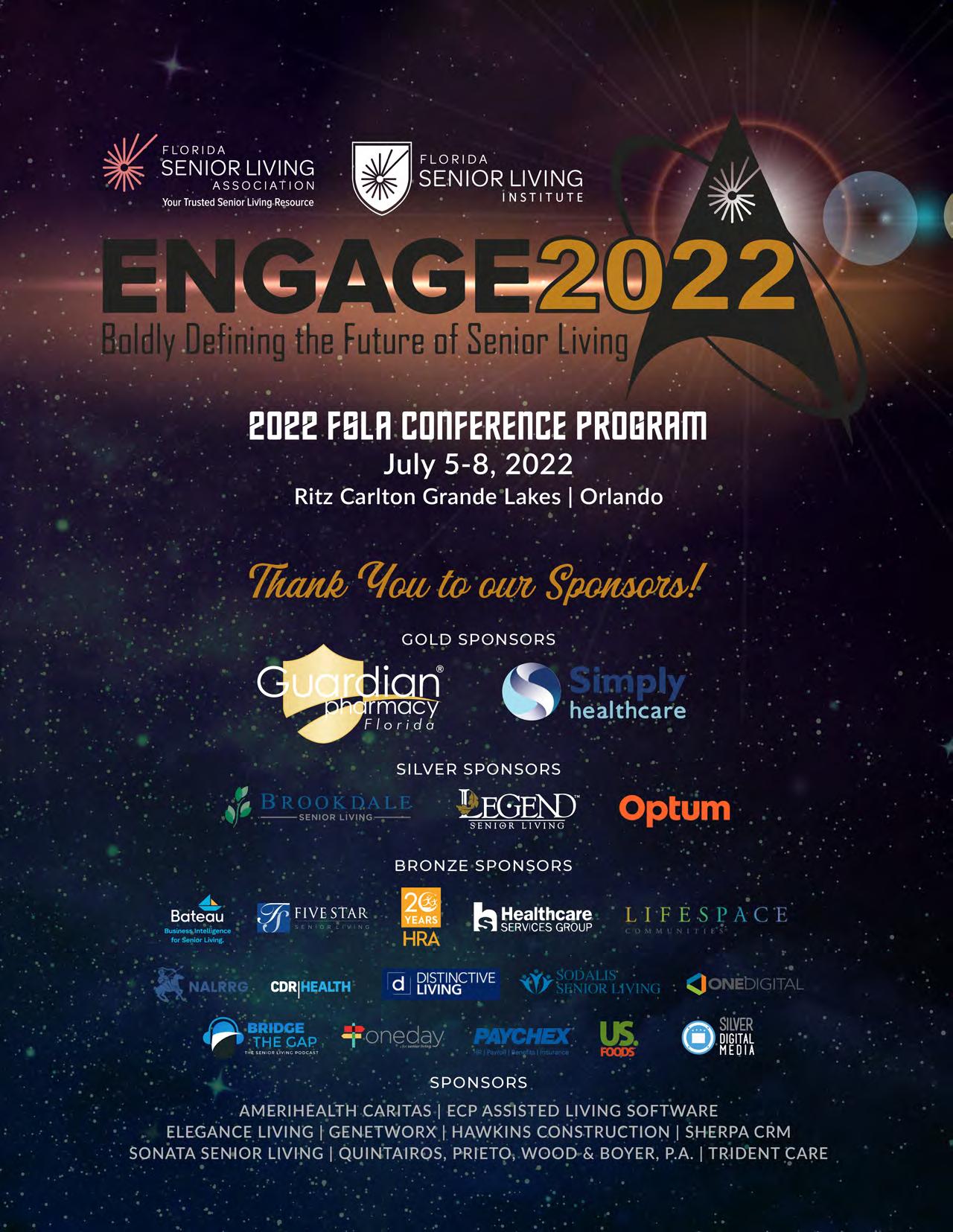
We are excited to welcome you to this year’s Senior Living Conference ENGAGE 2022, hosted by the Florida Senior Living Association (FSLA) and the Florida Senior Living Institute (FSLI).
Over the next several days, we will be Boldly Defining the Future of Senior Living here at the lovely Ritz-Carlton Orlando, Grande Lakes. This conference will be an opportunity to learn, network, and enjoy being together again.
The past two years have been incredibly unbelievable at best (basically, a complete #%$&*!) but we’re here looking to the future, creating an opportunity to move forward, and taking what we’ve learned to be better prepared for any future crisis.
There are so many people to thank for sharing their expertise and helping us to make this conference the best yet!
• Many thanks to FSLA’s Board of Directors and the Conference Committee for their excellent suggestions of topics and programming.
• FSLA and FSLI are proud to provide some of the highest quality education experts in the assisted living and memory care profession and we appreciate the amazing presenters here.
• Thank you to the many sponsors and exhibitors who give their time and resources each year; this conference would not be possible without their generous and consistent support.
• To the best attendees and members – thank you for choosing to register for our conference!
• And lastly, thank you to the FSLA/FSLI team for working extremely hard to plan, prepare and launch one of the best conferences yet!
Please take a few minutes to review the information in the program and familiarize yourself with the format, the conference app, the hotel and meeting space layout, as well as the schedule of events to maximize your continuing education credits. We are also offering NAB credits this year as an added bonus for those with licenses in other states. Plus, our sessions are being recorded and will be available on demand, totaling more than 25 CE credits available from this event.
Don’t forget to visit the exhibit hall, bid on various Silent Auction items to benefit the FSLA Political Committee, attend all of the general sessions and meal functions, and dress up for the Cowboys and Aliens Fun Night. We have lots of wild surprises in store!

On behalf of FSLA and FSLI, it is a distinct honor to serve and represent you and your community. We hope you enjoy the conference and find it to be a valuable asset to your career and personal growth.
All my best,
July 26-28, 2023

Boca Raton Resort
July 10-12, 2024
Ritz Carlton, Orlando
July 23-25, 2025
Harbor Beach Resort, Ft. Lauderdale
July 15-17, 2026
Ritz Carlton, Orlando
Gail Matillo, MPA
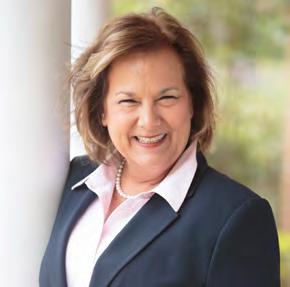
President & CEO (850) 496-2562
gmatillo@floridaseniorliving.org
Jason Hand, Esq.

VP of Public Policy & Legal Affairs (850) 443-0024
jhand@floridaseniorliving.org
Sheri LeaJean
Director of Education (850) 708-4971
sleajean@floridaseniorliving.org
Meredith Van Valkenburgh, MSAFA Project Director (850) 755-6583
meredith@floridaseniorliving.org
Heather Conley, MBA
Director of Marketing & Membership (850) 708-4972
hconley@floridaseniorliving.org
Jimmie Fay Griffin, LPN
Gail Matillo, MPA President & CEOAccounting and Membership Manager (850) 556-8896
jgriffin@floridaseniorliving.org


Grand Opening | Welcome Reception
Veterans Recognition | Puppy Pits
*All Events at The Ritz-Carlton Orlando, Grande Lakes*
6pm – 7:30pm

Presented by Bob Asztalos, Deputy Director, Florida Dept of Veterans Affairs; Music by Vance Garven; Puppy pits sponsored by HarborChase
The Ritz-Carlton Ballrooms 6pm – 7:30pm Silent Auction Opens

Silent Auction App & Kiosk sponsored by Lifespace Communities The Ritz-Carlton Ballrooms
You’re WANTED at an OUT OF THIS WORLD Fun Night!

Thursday, July 7 | 6:30 - 9 PM
The ritz-carlton ballrooms
*All Events at The Ritz-Carlton Orlando, Grande Lakes*


7am – 5pm
8am – 9:30am
Registration
Opening Keynote: Boldly Defining the Future
Presented by Max Major, world-renowned mentalist
Sponsored by Simply Healthcare Plans, Inc.
Exhibit Show and Refreshment Break
Puppy pits sponsored by HarborChase
Plaza Ballroom Registration Desk
Tuscany Ballroom
9:45am – 11:45am
Coffee sponsored by Elegance Senior Living
Refreshment Break sponsored by Quintairos, Prieto, Wood & Boyer, P.A.
Be Our Guest: Lunch & Chefs Competition
The Ritz-Carlton Ballrooms
12pm – 1:30pm
Presented by FSLA’s Food Stars Shawn McGregor, Gilbert Bolivar and Aaron Fish and featuring professional senior living dining chefs all competing for the coveted “Chef of the Year” award; Sponsored by US Foods, HCSG & IFSEA
Breakout sessions featuring five targeted tracks: Culinary & Hospitality
Leadership & Technology
1:40pm – 5:30pm
Operations & Regulatory
Clinical & Memory Care
Sales & Business Development
Tuscany Ballroom
1:40pm – 2:30pm
Session 1A
Leadership & Technology Track
Session 2A
Operations & Regulatory Track
Session 3A
Clinical & Memory Care Track
Session 4A
Sales & Business Development Track
Session 5A
Culinary & Hospitality Track
1:45pm – 3:15pm
BREAKOUT SESSION A
Healthy Executive Transitions: An Opportunity for Organizational Advancement
Presented by Tim Ficker, Executive VP of Advisory Services, LifeStar Living
Benefits of Hiring Skilled Immigrants
Presented by Thompkins White, Esq., Director, Nurse Services Group, Inc.; and Ray Raval, President, Professionals to USA, Inc.
Rapidly Transforming Healthcare with Telemedicine and Virtual Reality
Presented by Dr. Anurag Gupta MD, MBA, MMSc, CEO, Tembo Health; and Amy Huber, Director of Sales, Mvi Health, Penumbra, Inc.
Sponsored by GENETWORx
Behaviors of Best Sales Performers
Presented by Margot Cooke, National Sales Director, and Rebecca Townsend, Vice President of Revenue Operations, Sherpa CRM
Elevating Hospitality in the Senior Living Sector
Presented by Gilbert Bolivar, Vice President of Food and Beverage, Retirement Unlimited, Inc.
Reverse Trade Show I
Plaza Ballroom I
Plaza Ballroom III
Amalfi I & II
Tuscany Ballrooms
Plaza Ballroom II
Ritz-Carlton Prefunction Space
*All Events at The Ritz-Carlton Orlando, Grande Lakes*

TIME EVENT LOCATION

2:40pm – 3:30pm
Session 1B
Leadership & Technology Track
Session 2B
Operations & Regulatory Track
Session 3B
Clinical & Memory Care Track
Session 4B
Sales & Business Development Track
Session 5B
Culinary & Hospitality Track
3:30pm – 3:40pm
3:40pm – 4:30pm
Session 1C
Leadership & Technology Track
Session 2C
Operations & Regulatory Track
Session 3C
Clinical & Memory Care Track
Session 4C
Clinical & Memory Care Track
Session 5C
Culinary & Hospitality Track
BREAKOUT SESSION B
Legal Update: Recent Federal and State Regulations
Presented by Robin Khanal, Esq., Partner, Quintairos, Prieto, Wood & Boyer, P.A.; and Jason Hand, Esq., Vice President of Public Policy and Legal Affairs, FSLA
LinkedIn – Basics and Strategies
Presented by Howie Appel, Founder & CEO, Appel Resume Writing
The Role of the Health & Wellness Director: A Round Table Dialogue
Moderated by Monica Wilson, ICEBridge, LLC with participation from Legend Senior Living, Senior Lifestyle, Sonata Senior Living and SRI Management
Sponsored by GENETWORx
Sales + Operations = Occupancy Success!
Presented by: Jennifer Dixon, Founder, JD Solutions Group
Ten Things in 10 Minutes: An ED’s Guide to the Daily Kitchen Walkthrough
Presented by Aaron Fish, MBA, CHS, CEO, Trestle Hospitality Concepts
Refreshment Break
Sponsored by Quintairos, Prieto, Wood & Boyer, P.A.
BREAKOUT SESSION C
Why “No Comment” Isn’t An Option
Presented by Abby Walton, Anchor/Reporter, WCTV CBS Tallahassee and Sandi Poreda, APR, President, Bulldog Strategy Group
Resources for Successful Apprenticeships
Presented by Susan Bosse, MBA, EDP, Business & Workforce Development Director, CareerSource Florida; Nina Perez, MSN, RN, Co-Founder, TruMont; and Lynn Peoples, PhD, RN, Co-Founder, TruMont
I’m Tired and Burned Out
Presented by Dr. Gregory James, DO, MPH, Senior Medical Director, Florida Market of Optum Health
Sponsored by GENETWORx
Wellness, Innovation & Support for the Nursing Workforce
Presented by Dr. Rayna Letourneau, PhD, RN, Interim Executive Director, Florida Center for Nursing at the University of South Florida
Sponsored by GENETWORx
Creating an Unparalleled Dining Experience PostCOVID
Presented by Shawn McGregor, MBA, MCFBD, MCFE, CDM, Area Executive Chef, Healthcare Services Group
Plaza Ballroom I
Plaza Ballroom III
Amalfi I & II
Tuscany Ballrooms
Plaza Ballroom II
Plaza Ballroom I
Plaza Ballroom III
Amalfi I & II
Tuscany Ballrooms
Plaza Ballroom II
*All Events at The Ritz-Carlton Orlando, Grande Lakes*
TIME EVENT LOCATION

4:40pm – 5:30pm
Session 1D
Leadership & Technology Track
Session 2D
Operations & Regulatory Track

Session 3D
Clinical & Memory Care Track
Session 4D
Sales & Business Development Track
Session 5D
Culinary & Hospitality Track
6:30pm – 9pm
BREAKOUT SESSION D
Cocktails and Conversations: Video Strategies You Need for Recruitment & Retention
Presented by Jamie Merrill, Chief Operating Officer, Sonata Senior Living; Eric Varin, VP of Client Success, OneDay; and Michael Blodgett, Director of Demand Generation, OneDay
Cocktails and Conversations: Personal Branding
101 - How To Be Your Own Publicist
Presented by Laura Spencer, President, Spencer McMillan Public Relations
Cocktails and Conversations: Why We Live and Die
Presented by Robbie Meek, Chief Operating Officer, CDR Health
Sponsored by GENETWORx
Cocktails and Conversations: Guzzle ‘n Google — Quench Your Thirst for Google Knowledge
Presented by Erin Richey, Founder/CEO, Matura Marketing and Daniel Boyce, Chief Performance Officer, Matura Marketing
Cocktails and Conversations: Minding Your P’s & Q’s: A Proactive Approach to Consistent F&B Operations

Presented by Aaron Fish, MBA, CHS, CEO, Trestle Hospitality Concepts
Fun Night - Cowboys & Aliens
Puppy pits sponsored by HarborChase Wine Toss sponsored by Bateau
8pm Live Auction

8:30pm
Silent Auction Closes
Silent Auction App & Kiosk sponsored by Lifespace Communities
Plaza Ballroom I
Plaza Ballroom III
Amalfi I & II
Tuscany Ballrooms
Plaza Ballroom II
The Ritz-Carlton Ballrooms
The Ritz-Carlton Ballrooms
The Ritz-Carlton Ballrooms
*All Events at The Ritz-Carlton Orlando, Grande Lakes* TIME EVENT LOCATION

8am – 12pm
8am – 9am
9am – 2pm
9:10am – 10am
Session 1E
Leadership & Technology Track
Session 2E
Operations & Regulatory Track
Session 3E
Clinical & Memory Care Track
Session 4E
Clinical & Memory Care Track
Culinary & Hospitality Track
Session 5E
Operations & Regulatory Track
9:15am – 10:45am
10:10am – 11am
11am – 12pm
Registration
Plenary Session: Managing the Unexpected
Presented by Sara Brady, President, Sara Brady Public Relations; Sponsored by Sodalis Senior Living
Exhibitors Break Down
Note: There will be a penalty for exhibitors who leave before this time.
BREAKOUT SESSION E
Senior Living at 10 Speeds (The Market, Trends and Taxes)
Presented by Scott Bridgeman, CPA and Kevin De Santi, CPA, CLA, LLP
Registered Apprenticeships: Workforce Solutions for Health
Presented by Susan Biszewski-Eber, MA, Director of Workforce Development, MissionCare Collective
Risky Business: Risk Management in the Clinical Setting
Presented by Robin A. Bleier, RN, HCRM, LNC, President, RB Health Partners, Inc.; Sponsored by GENETWORx
Secret Sauce: Dining and Dementia
Presented by Toni Fisk, CDP, CMDCP, CDM CFPP, President, DinnerWEARhc, Inc.; Sponsored by GENETWORx
Diversifying & Growing the Workforce
Presented by Debbie Telsey, Founder, I Can Living and Learning Center Founder; Sandy Quinter, Director of Business Development, I Can Living and Learning Center; and Tiffany Vause, Director of Strategic Initiatives, Florida Ready to Work
Reverse Trade Show II
The Funny Thing about Stress
Presented by Kay Frances, MBA; Sponsored by Guardian Pharmacy; Coffee sponsored by Distinctive Living, LLC
Spotlight: Seniors and Technology

Presented by Stefano Selorio, CEO, Carevocacy
Legislative Update & Grassroots Advocacy: Critical, Not Political
Presented by James McFaddin, Partner, The Southern Group; and Jason Hand, Esq., Vice President of Public Policy and Legal Affairs, FSLA
Luncheon, Awards Ceremony, Board Installation
Plaza Ballroom Registration Desk
Tuscany Ballroom
The Ritz-Carlton Ballrooms
Plaza Ballroom I
Plaza Ballroom III
12pm – 1:30pm
Luncheon sponsored by Optum; Awards Ceremony sponsored by PAYCHEX; Table décor sponsored by Sonata Senior Living
Regulatory Update from the Agency for Health Care Administration
Amalfi I & II
Plaza Ballroom II
Tuscany Ballrooms
Ritz-Carlton Prefunction Space
Tuscany Ballrooms
Tuscany Ballrooms
Tuscany Ballrooms
1:30pm – 3pm
Presented by Simone Marstiller, Esq., Secretary, Agency for Health Care Administration; and Kim Smoak, MSH, Deputy Secretary, Division of Health Quality Assurance, Agency for Health Care Administration; Sponsored by CDR Health Administration
3pm Conference Ends
Tuscany Ballrooms
Tuscany Ballrooms
LEADERSHIP DEVELOPMENT
MONTHLY VIRTUAL EDUCATION
WEEKLY E-NEWSLETTERS & PRINT MAGAZINE
INDUSTRY TRENDS & BEST PRACTICES
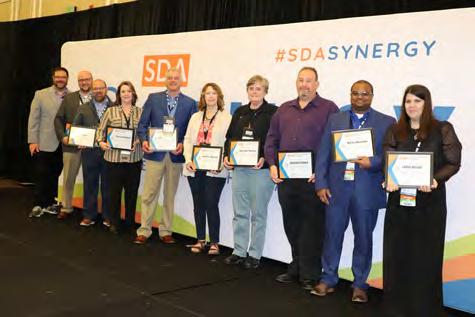
AWARDS & RECOGNITION
CONFERENCES & EVENTS
SENIOR DINING CAREERS


S D A W o r k f o r c e & C u l t u r e C h a n g e S y m p o s i u m
t o b e h e l d i n L a s V e g a s , N V , N o v e m b e r 6 - 9 , w i l l b r i n g t o g e t h e r s e n i o r l i v i n g l e a d e r s f r o m
v a r i o u s o r g a n i z a t i o n s t o d i s c o v e r h o w t o a l i g n s e n i o r l i v i n g w i t h h o s p i t a l i t y c u l t u r e w i t h a
k e e n f o c u s o n w o r k f o r c e d e v e l o p m e n t , r e c r u i t i n g , t r a i n i n g , a n d r e t e n t i o n o f t o p t a l e n t t o r e m a i n c o m p e t i t i v e i n t h e h o s p i t a l i t y m a r k e t p l a c e .
April 16 - 19, 2023 | Houston, Texas
2023

A s t h e p r i m a r y e d u c a t o r a n d c u l t u r e c a t a l y s t f o r s e n i o r l i v i n g d i n i n g & h o s p i t a l i t y , w e g e n u i n e l y b e l i e v e i t w i l l t a k e a v i l l a g e t o a f f e c t r e a l w o r k p l a c e c u l t u r e c h a n g e r o o t e d i n h o s p i t a l i t y t h r o u g h o u t t h e s e n i o r l i v i n g i n d u s t r y
The only dedicated association for food service and hospitality in the senior living industry.by matt depenbrock
The increasing average age of assisted living residents and their need for more hands-on care coupled with the dire staffing issues have created significant challenges for assisted living facilities (ALFs). But the right, long-term care (LTC) pharmacy can serve as an essential partner and ease the burdens on an understaffed community workforce, thereby boosting staff retention, and help provide support, convenience and safety with numerous advantages for both staff and residents:
When partnering with a comprehensive pharmacy partner, especially one that is local, you can expect:
• A medication management team: Keeping residents safe and healthy is the top priority for all ALFs and requires expertise from a medication management team. This team consists of a dedicated group of specialists that pays attention to all your concerns and makes getting to know your staff and residents’ medication a top priority. The medication management team should work directly with residents’ doctors, community
nurses and community staff/ administration. This integrated approach provides an extra layer of resident safety and security.
• Medication safety solutions: An LTC pharmacy should review a resident’s entire drug regimen regularly and when a new medication is prescribed to make sure drug combinations are safe, medications are necessary, and any potentially harmful reactions are minimized.
• Consistent, smart packaging: Various packaging from multiple pharmacies or with several dosage/medication types can lead to errors in medication administration. An LTC pharmacy eliminates these concerns with consistent, safe packaging that separates medications by date and time of day, making it easy for staff to ensure the resident takes the right medications at the right time. “NO TOUCH” packaging that includes a barcode that can be scanned and used to easily track medicines and their administration helps mitigate human error.
•
• Use of the latest technology: Access to electronic health records and electronic medication administration records (eMARs) can reduce medication errors, keeping residents safe. With this technology, staff will always have real-time data, simplifying updating and ordering of medications, offering access to resident medication profiles with previous history, and improving accuracy through e-prescribing removing the potential for error when MARs are hand transcribed.
Additionally, your LTC pharmacy should utilize the most advanced technology, analytics and insights to help increase profitability, safety and efficiency. This includes tracking extensive community data and transforming it into easy-tounderstand analytic reports that evaluate both high-level and specific data on residents, medications and more.
• Accurate medication billing: From issues with pre-authorization and noncovered medications to the customer support 800 numbers,
residents often experience challenges when trying to resolve problems with their bills and seek community staff help. Look for your pharmacy partner to work with your residents’ physicians and insurance companies to verify all medications, or the clinically equivalent alternatives, are covered by insurance/Medicare/ Medicaid before the prescription is filled and provide resident billing assistance. Resident Medicare Part D guidance is another invaluable resource..
• Education and training: Well-educated staff are more effective and make fewer
mistakes. Look for a pharmacy that collaborates with you to evaluate the needs of your staff and offers onsite training and continuing education courses. From onsite education where nurses and pharmacist consultants train staff on the med pass, fall prevention, Alzheimer’s, the basics of antipsychotic use and more, to classes that qualify for CEU credits, this training will build staff confidence, leading to more positive resident outcomes and a higher probability of staff retention.
• Direct deliveries to ALFs: LTC pharmacies serve as an important lifeline you can depend
on to resolve issues at any time and schedule medication deliveries that fit your schedule. When you have questions or an emergency, you should have confidence that pharmacists and staff are available 24/7 to provide answers and deliver medications
Choosing an LTC pharmacy that provides experience, expertise and convenience can help mitigate the issues your staff is facing Selecting the right LTC pharmacy partner will make all the difference in the world for your residents, staff and your community.
matt depenbrock Business Development Leader Guardian Pharmacy of Florida
Founded in 1919, Plastridge Insurance Agency has served the South Florida community for over 103 years.



Because of our extensive experience and relationships in this risk specialty area we have an exclusive and proprietary program with Lloyd’s of London allowing our clients to access some of the best products specific to their insurance coverage needs
We’re here when you need us.

Hiring senior living professionals has always been challenging. However, in this intense talent market, it’s even more so. The pressure is on to fill key senior care positions despite stiff competition and candidates who have plenty of choices and options.
That said, gone are the days of interviewing and hiring at a snail’s pace. It’s time to review your hiring process and cut any unnecessary steps to pick up the pace. Speed in hiring could be your magic bullet for landing talent before your senior living competition snatches them up.
Now, we’re not suggesting that you skip the thorough vetting and hiring process needed to make a thoughtful decision. Rather, as senior living executive recruiters, we recommend that you make a commitment to speed. The average nationwide time it takes to fill a key position is 25 business days and conversely, the best candidates are off the market in 10 days.
Hiring faster improves your chances of acquiring top talent before they accept a competing offer. It also strengthens your position as a senior living employer of choice and saves the high cost of keeping key positions open for a long period of time such as Assisted Living Administrator, Nursing Home Administrator, Executive Director, Nurse Leader, etc.
Write
Know who you’re looking for. Be very accurate with your job description to attract the right candidates. Be sure to include keywords to increase the chances of your job showing up in search results. List requirements for the job and then, make the case for why they would want to work for your senior living organization. Include what’s important to today’s workers: Flexibility, Extra PTO, Employee Wellness Programs, etc. If your longterm care facility offers shorter and flexible shifts, highlight it. Employers have found that by advertising their job opportunities with “flexible hours” they receive twice as many inquiries and applicants.
Post Jobs
Post your open positions in front of the people you’re seeking to hire. The quickest way to do that is to go where they are…on social media including LinkedIn, Facebook, and Twitter. Also, consider posting on senior living association job boards such as LeadingAge and Argentum. Posting jobs on these platforms helps to increase the visibility of your jobs and therefore, can help you capture candidates’ attention in a speedy manner.
Involve Your Employees.
Notify your employees of an urgent job opening that must be filled immediately. Post the job opening on your organization’s Intranet, website
by julie rupenskicareer page, or bulletin board. In addition, create a rewards program where current employees receive referral bonuses when recommending a candidate who is ultimately hired. The most attractive bonus is cash. However, some organizations prefer to reward employees with gift cards or extra time off.
The days of sifting through resumes and job applications to find that one perfect candidate have ended. Today, it’s about powering your recruitment processes with the right technology in order to speed up the hiring process, grow your database, decrease paperwork, keep track of job applicants, increase hiring quality, and more.
An automated video tool helps organizations to screen more candidates in an expedient manner using video interviews before inperson interviews. This is a smart way to shortlist candidates and save time. A live interview tool will allow you to connect in real-time for a face-to-face interaction. Plus, you will be able to record your live session and as a result, share it with your management team for their input so time isn’t wasted.
If a highly qualified candidate meets your criteria and shows interest in working at your organization, act quickly. Again, start with a virtual interview and then, find a way to
shorten the length of your next steps. One way is to decrease the number of managers involved. Also, cutting out any unnecessary steps or delays will save time. Any delays during the interviewing process can cause candidate frustration and a loss of interest.
Consider Off-Hour Interviews.
When conducting an in-person interview, consider same-day interviews as well as off-hour interview times such as evenings and weekends. That makes it ultra-convenient for employed candidates or passive candidates to interview. The more convenient, the more likely they will be impressed and show up. This will cut down on the chances of a candidate ghosting you.

Focus on Candidate-Engagement. Keep your candidates interested! Stay in touch with your candidates by communicating often. This builds trust and a relationship. Show genuine interest about what they’re looking for personally and professionally. The feeling of being mismanaged or badly treated during the hiring process significantly reduces your chances of landing any candidate.
Check References Sooner. Often, references aren’t checked until an offer is about to be made. But there’s no reason to wait that long. Ask for references from your top candidates much sooner, so you can start calling sooner.
Hire a Reputable Senior Living Search Firm.
Professional and reputable senior living search firms have access to a
network of highly qualified industry talent, both active and passive candidates. Some recruit for both permanent and interim placements. They already have an existing pool of vetted talent, understand the senior living skill sets required at all levels, possess the acumen to evaluate CV’s and resumes along with the ability to identify the right fit. They work in an expedient manner and in the strictest of confidence.
In today’s intense senior living job market where competition for talent is stiff, if you don’t reduce the time it takes to make a hire, you stand to lose top talent. Make sure your senior living organization recognizes the need for speed when hiring.
 julie rupinski Founder & CEO MedBest Recruiting
julie rupinski Founder & CEO MedBest Recruiting
 Since opening its doors in 2001, Julie has grown MedBest into an award winning, multimillion-dollar national firm, garnering impressive awards including INC 5000 2021 and Tampa Bay Fast 50 2021! Julie was also named as on honoree for the “Top 100 Women Leaders in Tampa 2022 by “Women We Admire.”
Since opening its doors in 2001, Julie has grown MedBest into an award winning, multimillion-dollar national firm, garnering impressive awards including INC 5000 2021 and Tampa Bay Fast 50 2021! Julie was also named as on honoree for the “Top 100 Women Leaders in Tampa 2022 by “Women We Admire.”
Brookdale Hermitage in Tallahassee was proud to announce the nomination of their Resident Programs Director Twanna Jones for the 2021 Brookdale Senior Living Inc. Cornerstone Award. President and CEO Lucinda Baier gifted her a special CEO Coin to commemorate this achievement. Pictured here alongside resident Ms. Joan, Twanna continues to inspire her team, residents and community with her tireless dedication and leadership. She brings excitement and adventure to the residents every day through a myriad of activities. Congratulations Twanna!
AgeTech is at the forefront at Sodalis Defuniak Springs this spring. AgeTech is the technology that’s designed to meet the needs of older adults and those who care for them. These virtual reality goggles immerse their residents in entertaining and informative experiences that can lift spirits and combat isolation. From skydiving to Broadway shows, Zoo animal and pet therapy experiences, virtual reality provides them a range of innovative activities. Mrs. Bell enjoys the beautiful scenery at Mt. Everest and Mrs. Pouncey thrives on theatre productions.
Cypress Cove life plan community broke ground in April on a 12-acre, gated, luxury home expansion called The Oaks at Cypress Cove. All of the 24 elevated residences and 24 villas pre-sold months before construction began. With a nod to trends in luxury senior living, all the independent living homes will feature smart home technology for safety and convenience, as well as proactive healthcare initiatives.
“We’ve responded to the rapid growth here in Southwest Florida (SWFL) by developing luxurious, state-of-the-art residences combined with enhanced amenities that will truly have our
residents saying they love where they live,” said Troy Churchill, LNHA, MHA, president and CEO of Cypress Living, the management company for Cypress Cove. “This year Cypress Cove turned 23 and today we start a new chapter with this groundbreaking as we continue to create better tomorrows here in our SWFL community.” Located at the corner of Summerlin Road and Bass Road, the project is expected to be completed by the end of 2023. The construction costs are estimated at $46 million. Cypress Cove is proud to partner with RLPS Architects, Johnson Engineering, and Stantec for the design and Chris-Tel Construction as the construction manager of The Oaks at Cypress Cove. Troy Churchill is pictured here (far left) breaking ground alongside members of the Lee County Resources Board of Directors and Cypress Cove Executive Director Mary Franklin.
(4,8)
During a recent Monday Motivations event, multiple activities enriched the lives of residents at Serenades by Sonata at the Villages. Furry friend Kaylee and Nanci Goslee greeted residents, offering relaxing therapy and soft fur, plus a fun Wheel of Fortune word game captivated players.

The Cove at Marsh Landing, in conjunction with ownership Longview Senior Housing and the JAX Chamber, recently revealed a multi-million dollar renovation to the upscale assisted living and memory care community situated in the heart of Jacksonville Beach.

Originally opened in 1995, this fullscale renovation brings a fresh, coastal design to all public spaces, activity areas, dining room, and offices, as well as a completely refreshed Memory Care unit. West End Interiors led the interior design process for the renovation.
“We are thrilled to work with ownership to unveil a contemporary look and feel to this beloved community,” said Don Bishop, CEO, SRI Management.
“Jacksonville Beach is a desirable destination for seniors. With a fresh look and a design plan to better meet the needs of our residents, The Cove at Marsh Landing is the ideal locale for families seeking the absolute best in care for their loved ones in this amazing seaside region.” Don Bishop is pictured with Executive Director Chris Ingold during the ceremony.
Congratulations are in order for two Florida Discovery Senior Living communities which were recognized as “Best” in all three service areas (independent living, assisted living and memory care) by the U.S. News & World Report inaugural 2022 Best
achieved this distinct honor out of only 25 toprated communities nationwide. U.S. News and its survey provider collected data on more than 3,000 communities throughout the continental U.S. and Hawaii, representing more than 80 senior living operators. From that data set, U.S. News analysts identified 1,272 communities that excel in independent living, assisted living and/ or memory
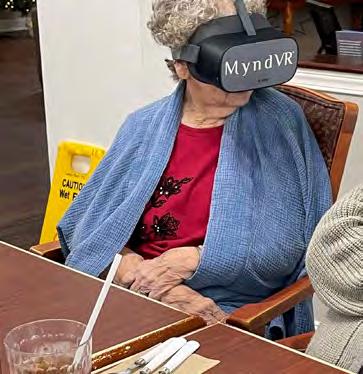



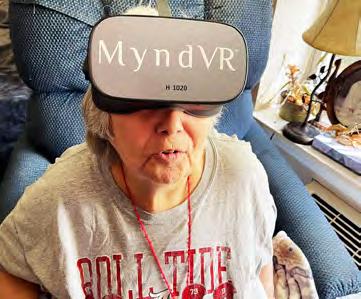

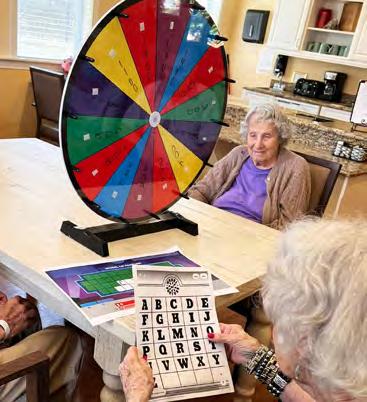

Assisted living regulations, rules and forms are always changing.



Stay up-to-date with your copy of the FSLA Assisted Living Resource Guide.

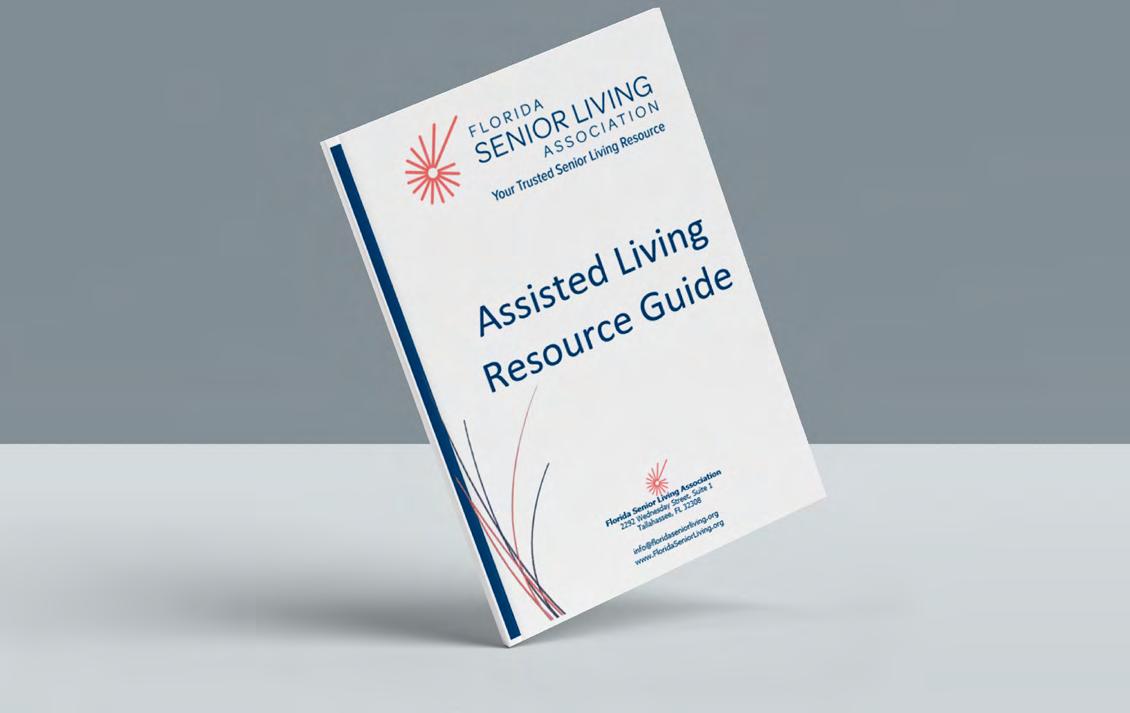
I have fond memories of being a young child running around on the beach, trying to dig up what my parents called “sand fleas”, as the waves retreated back into ocean. Quickly, you see the breathing hole of the crustation in the sand, drop the plastic bucket and dive in with your hands to grab it. I cannot remember if we ever caught them, but with five siblings, there had to be a competition of a victor and a loser. If you have never experienced the hunt, it is a way to keep you busy for hours and exhausted at the end of the day. Hence, my parents were geniuses.
I cannot help but imagine, any employer trying to recruit and fill positions is like being on the beach trying to collect “sand fleas”, just exhausting. The Bureau of Labor Statistics releases the national unemployment rate the first Friday of every month at 0830 EST. The last few released rates were lower than the US natural rate of unemployment of 4.4%. This means there are fewer available workers and more unfilled positions, like the tide has washed them away without a trace. We need to get off the beach, and away from that number, 3.6% in April. Let’s imagine a more robust approach to solving this issue and imagine those potential hires that are not included in that percentage of eligible employees. To improve recruiting, we need to team up, partner up, participate, and be an active part in a great marketing campaign through your local Regional Career Source (RCS). Here’s a three-prong approach to kick things into high gear.
One, connect with your RCS. Meet them, understand the services they offer, and have a good list of contacts to employ those services. FSLA is doing this through webinars in partnership with your regional RCS. There are different buckets of funding, which depends on the regional RCS. There are some with On-The-Job (OJT) funding, funding that even covers the first six months of salary plus childcare and health insurance. Some funding also pays for existing employees to increase job skills. Other funding will target younger demographics (18-24), and cover training and salary up to 30 hours a week. Have you dropped your bucket yet? There is more.
Two, get involved with your RCS. Every RCS is engaged in a multitude of hiring events. This includes in-person, virtual, and/or private. Yes, and by private, we can work with your RCS to create an ALF focused job fair. So many opportunities exist outside of healthcare that many potential candidates may not be aware of. Private events/job fairs can be hosted at one of the local communities or another site coordinated by the RCS. Incorporating other partners will also enhance these events. Local trade schools and colleges are excellent partners that can provide both educational programs and connect you with candidates that are not included in the unemployment numbers. Local public schools are another underutilized partner that should be considered. Many high schools have
medical programs or are considering future development in this area. They may need a place for clinicals or just a place to visit to introduce another side of a profession.
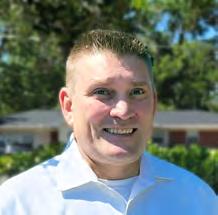
Three, focus on community involvement. If you build it, they will come. Get involved with the different boards, or committees. Think of all the sectors ALFs touch. Some RCSs have local healthcare boards that meet and address needs. Share success stories and build a stronger community. If your local RCS does not yet have one, then it is time to get one started. Again, include your RCS partners, bring in other industry partners, plan sector specific hire events, outreach, explore improving communication, better recruiting tools, and set overall goals. Time invested in mitigating factors now will greatly reduce the time needed for putting out these fires. Joining together to make our communities stronger through a continuous marketing campaign will get us closer to solving staffing shortages and filling much needed positions.
Don’t waste your time chasing sand fleas any longer! Get busy today making those connections needed to fill your buckets with an abundance of new hire opportunities. For more information, contact Project Director, Meredith Van Valkenburgh at meredith@floridaseniorliving.org or (850) 755-6583.
 meredith van valkenburgh Project Director Florida Senior Living Institute
meredith van valkenburgh Project Director Florida Senior Living Institute
13465 PASTEUR BOULEVARD PALM BEACH GARDENS, FL 33418 561-227-0065


Assisted Living Facility License #13239
•24/7 on-site licensed nurses and full-time management nurses
3490 THRIVE DRIVE NAPLES, FL 34105 239-354-7081
Assisted Living Facility License #13285
• Delicious, nutritious meals prepared by our Taste of RUI Executive Chef, served in a restaurant- style setting with tableside beer and wine service
•A full life enrichment calendar
• LUXE Unlimited – Full service salon and spa
• RUI FIT programming and gym
•Physical, occupational and speech therapy on-site
• Housekeeping and laundry services
15800 B EACHWALK BO ULEVARD FORT MYERS, FL 33908 239.349.3769
Assisted Living Facility License #13074

• Scheduled transportation
• All utilities including cable and Wi-Fi
• RUI University programming and classroom for continuing education
• Leash on Life – pet concierge services
• Spacious studios, one bedroom, and two bedrooms many with full kitchens
• Residential living, assisted living and Inspiritás – memory care
For more information, and to schedule a tour, call an RUI community today.
1060 CLARITY POINTE DRIVE TALLAHASSEE, FL 32308 850-219-2900
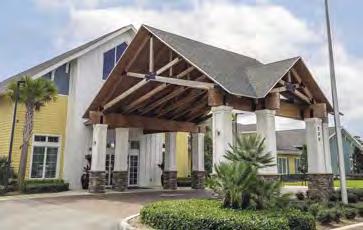
Assisted Living Facility License #13113
™ of Pensacola
8601 N. DAVIS HIGHWAY PENSACOLA, FL 32514 850-898-3334
™ of Stuart
500 S.E. INDIAN STREET STUART, FL 34997 772-403-0573
Assisted Living Facility License #13225
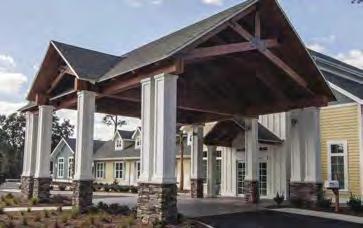
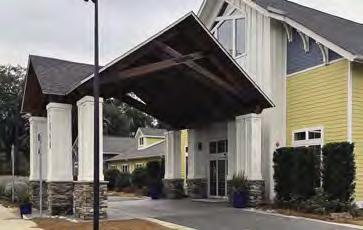
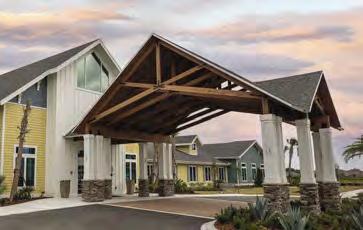
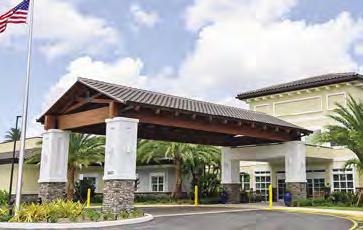
2395 MINTON ROAD
WEST MELBOURNE, FL 32904 321-220-0295
Assisted Living Facility License #13553
™ of Wildwood
7330 POWELL ROAD WILDWOOD, FL 34785 352-254-7550
Assisted Living Facility License #13436
TH E AT COCO NUT CREE K
MEMOR Y CARE
5461 JOHNSON ROAD COCONUT CREEK, FL 33073 954-246-7000
Assisted Living Facility License #13339
Our Inspiritás “neighborhood” is secured for resident safety yet still offers beautifully designed private garden and courtyard areas. It hosts a variety of Life Havens, designated areas to experience music and art and interactive Wall Art. These settings allow residents to explore and engage with the scenes that stimulate memories and topics of conversation. Our goal is to ensure each resident receives compassionate care to meet their emotional, social, physical, spiritual, and cognitive needs. Above all, we provide our residents with smiles, personalizedattention, encouragement, and family members with peace of mind.
• 24/7 on-site licensed nurses and full-time management nurses
• Outdoor enclosed courtyard with garden beds, walking paths and covered patios
• A full life enrichment calendar
• LUXE Unlimited – Salon
• Physical, occupational and speech therapy on-site
• Housekeeping and laundry services
• Zero Entry Showers and automatic lights in bathrooms
• Private studios and companion suites


You’ve heard the story. The daughter gets a call at work for the third time this week. Mom, recently widowed, is walking on the road in traffic. Rushing from her office, the daughter finds Mom and takes her in the house. Next, is the talk. “Mom, we must find a place for you. I am worried sick that something will happen to you.” Mom, frightened, screams “I’m not going to that nursing home to die!” The daughter, having done her homework and researched assisted living communities, gently hugs mom, and whispers, “I agree. I have the perfect place for you. You’ll feel so much better once you’re around people and taking your medication.”
I can only imagine how many times a week this type of conversation takes place. It is scary, heartbreaking, and oftentimes, too difficult to face.
However, as assisted living continues to grow in stature and numbers, more and more families look at this alternative living option. Nursing homes will continue to have a place in the continuum of senior care but not at the same level as years past. Assisted living has gotten more sophisticated and modern. This senior living option is an Aston Martin compared to a Ford Pinto. There is just no comparison. The growth shows it, and the numbers prove it!
From 2015 – 2022, assisted living grew by 20 communities and 22,544 beds. It doesn’t seem like a lot of growth until you analyze what has happened in Florida.
The ALF communities with 1 – 24 beds decreased by 176 communities and 2.279 beds during the same time.
On the other hand, communities with 100 – 350 beds increased by 140 communities and 19,615 beds, accounting for an 87% increase! Today, in Florida, there are a total of 3092 assisted living communities and 114,003 beds.
As for nursing homes, there are 713 buildings and 86,423 beds. In case you are wondering, we passed nursing homes in the licensed bed category in 2018 and we have never looked back. Look up - the sky is the limit! We are just getting started!
krone weidler Founding Member of the Florida Senior Living Association (FSLA) Principal | Cadre Healthcare Realty Advisors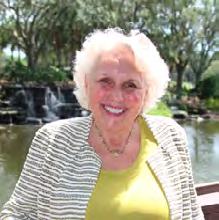
The term “Key Performance Indicator” (or KPI) is one of the most common terms in data. Many teams spend hours each week filling out KPI reports that show specific numbers (like moveouts or falls) going up or down; simple charts that show a trend.
But are KPIs actually driving positive change?
Or are we all spending so much time tracking KPIs that we’re not taking the time to understand what change should be happening and why? At the end of the day, data (and technology in general) is only useful if it’s used: putting KPIs into a spreadsheet that gets emailed to everyone each week is only useful if it creates change.
That’s why I encourage everyone to reframe their data conversations to be around people, rather than KPIs. One useful framework on how to do that is through the “jobs to be done” theory. In simple terms, this theory can be applied to Senior Living by helping owners and operators build out a resident-centric business by correlating data points to specific jobs that need to be done in order to accomplish that goal.
Person-centered data conversations lead to measurable and impactful goals. Instead of focusing on the number rising or falling, we’re focusing on the habits of the person(s) responsible for that data point. This shift creates lasting change.
This metricates the “why” behind the goal and creates a sustainable, ripple effect of positive and focused change.
The “jobs to be done” framework adds context to data, too. Rather than just putting numbers in a spreadsheet, it asks questions like:
• Who is going to use this data?
• What do they want to accomplish in their job?
• What goal can we set to drive positive change?
In a day and age where retention and industry growth is at the top of mind for many leaders, the “jobs to be done” framework gives teams clarity on what’s expected, why, and what change is needed in order to meet expectations.
We often hear people become frustrated by the retroactive nature of
their data, and all too often it’s because the data hasn’t been tied to a job. There is no “next step” outside of waiting for the next month-in-review report.
Next time you have a spreadsheet full of numbers, think about:
1. who this data is useful for
2. what change you want from the data, and
3. what jobs need to be done to see that change.
If there’s any industry that’s full of meaningful “why’s” behind an action, it’s Senior Living. So why should our data and use of technology be any different?
rachel kesselem Bateau | Senior Account Executive
Too often, senior living operators and reporters are like oil and water. “No comment” (or no answer) has become the phrase du jour when a member of the media reaches out with a question. But it doesn’t have to be this way. With a good foundation for professional relationships and some basic media relations practice, you can work with the media instead of avoiding them like the plague.
Let’s start with the basic premise that people treat each other better if they have an existing relationship. The worst time to make friends is when you really need them, so make a proactive effort to get to know the reporters who are likely to cover senior-related or health care-related issues in your community’s media market. This can be as simple as inviting them out for a cup of coffee to introduce yourself. You both have jobs to do, but if you can look for a way to support each other, the relationships may provide you with long-term benefits. Just remember, you’re never really off the record, so be professional.
If a member of the media does ask you for an interview, there are some basic principles you can follow to manage the interview as best you can. Remember – you are never guaranteed full control or positive coverage; however, with good message management, you can dramatically improve how you are portrayed.
First, figure out in advance what your purpose is for the interview. Who are you trying to reach and what do you need to communicate? Having a clear

goal will keep you focused, and key messages can improve the probability that your audience will receive clear, consistent and compelling information.
Develop three key messages to serve as the foundation for all communications and to weave into each interview. They should fit on one page: each as two or three sentences in length or 15 to 30 seconds when spoken. Your goal is to introduce and reinforce key messages through supporting information, such as:
• Facts: Use simple and descriptive statements.
• Statistics or figures: Put information into easy-tounderstand or quantifiable terms.
• Authorities: Quote credible, relevant third-party experts.
• Stories: Share a case study, personal experience, anecdote or analogy.
Questions can be the scariest part of an interview, but if you know your subject matter well, you should be able to figure out what you’re likely to be asked. After identifying potential queries, including what you’re afraid of being asked, you can arm yourself with key message-laden responses and practice delivering those answers so you can provide them smoothly when asked by the interviewer.
Practice really is key to delivering a good interview. If you know in advance what you’re likely to be asked, what
you want to communicate and how effectively you can communicate, you can prep for any interview just like you would prep for important meetings with shareholders or sales pitches. Ask someone to evaluate how clearly you speak, whether certain words are difficult for you to enunciate and whether you have any nervous behaviors, such as excessive blinking, strange hand gestures or swaying back and forth. If you’re aware of these behaviors ahead of time, you can practice correcting them.
For TV interviews, projecting confidence is especially critical. When asked a question, pause and think quietly about your next thought. Finish your sentence and wait for the reporter to ask another question; don’t talk just to fill a silence. Be aware of your non-verbal messages, including facial expressions, posture, gestures, etc. And talk to the interviewer, not the camera. Maintain good eye contact, listen and speak with conviction.
You may be in a situation where you can’t necessarily plan out when or where you’re asked for an interview, such as on the courthouse steps. However, the preparation method is the same. Think critically about what a reporter might want to cover (or ask your new reporter friends) and plan out the key messages you need to communicate and how you might answer difficult questions. Remember, “No comment” is NOT AN OPTION. At worst, let the reporter know that you can’t address that question at this time. It’s also ok to calmly walk away
if a reporter is being unprofessional. What you DON’T want to do is let a reporter provoke you into giving a reactive or emotional response.

Sometimes, a good media interview can be extremely beneficial to you or your client; at the very least, minimizing potentially negative coverage is always a good idea. Use this combination of proactive relationship building and practical preparation to begin taking the terror (or distaste) out of your interactions with the media.

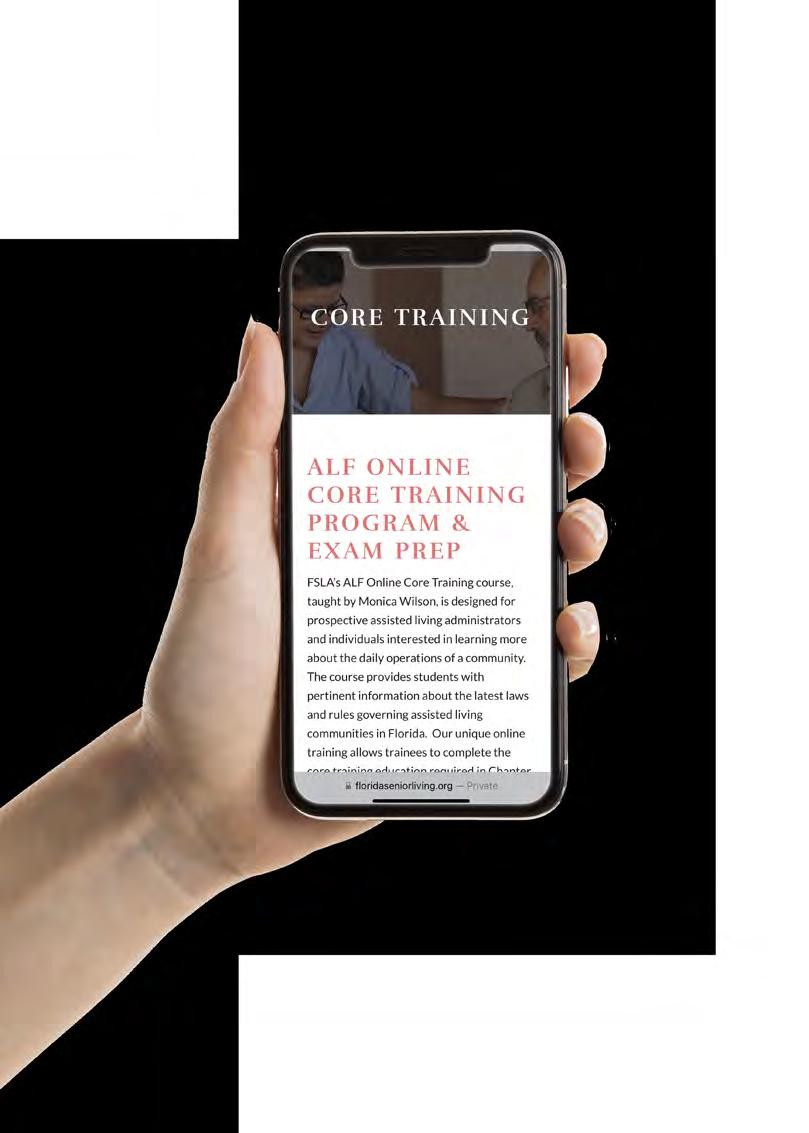
 sandi poreda , apr Bulldog Strategy Group
sandi poreda , apr Bulldog Strategy Group

US News & World Report recently researched the Best Senior Living communities in Florida based on resident satisfaction, value, caregiving, dining quality and more. FSLA congratulates the following member communities recognized for ranking among the Best of the Best in one or more categories including: Best Assisted Living, Best Memory Care and Best Indpendent Living.




Between large -provider resources and local support, we can help you navigate changes. Ask us about tools to contain costs, improve patient care and enhance safety at guardianpharmacy.com/contact.















